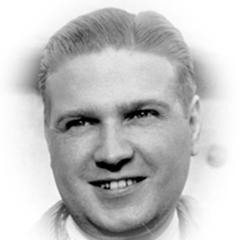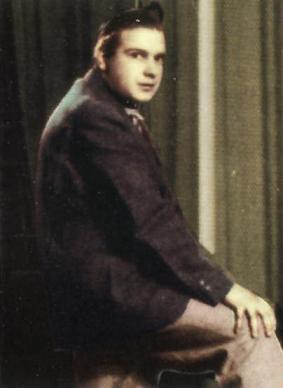Leigh Harline
 Leigh Adrian Harline was an Academy Award-winning film composer and songwriter. He was born on 26 March 1907, in Salt Lake City, Utah. He was the son of soldier Charles Härlin and Jahanna Matilda Härlin. He was the youngest of 13 children. His parents came from the village of Härfsta in Simtuna parish, Sweden. They were baptized members of The Church of Jesus Christ of Latter-day Saints in 1888, and moved to Salt Lake City, Utah in 1891. Once in the United States, they changed their surname to Harline. Leigh was baptized a member of the Church at age eight.
Leigh Adrian Harline was an Academy Award-winning film composer and songwriter. He was born on 26 March 1907, in Salt Lake City, Utah. He was the son of soldier Charles Härlin and Jahanna Matilda Härlin. He was the youngest of 13 children. His parents came from the village of Härfsta in Simtuna parish, Sweden. They were baptized members of The Church of Jesus Christ of Latter-day Saints in 1888, and moved to Salt Lake City, Utah in 1891. Once in the United States, they changed their surname to Harline. Leigh was baptized a member of the Church at age eight.
He attended Granite High School in Salt Lake City, Utah, and later studied at the University of Utah. After graduating from the University of Utah, he studied piano and organ with Mormon Tabernacle Choir conductor, J. Spencer Cornwall.
In 1928, he moved to California and worked as a composer, conductor, arranger, instrumentalist, singer, and announcer at radio stations in San Francisco and Los Angeles. He arranged music for the first transcontinental radio broadcast to originate from the West Coast in 1931, and was then hired by Walt Disney in 1932, where he scored over 50 tunes, including tunes for the Silly Symphonies cartoon series in the 1930s. He became well known for his “musical sophistication that was uniquely ‘Harline-esque’ by weaving rich tapestries of mood-setting underscores and penning memorable melodies for animated shorts and features.”
He won the Academy Award for Best Original Music Score and the Academy Award for Best Original Song for “When You Wish Upon a Star,” featured in Disney’s classic film Pinocchio (1940). The tune later became the theme song for the Disney television series, The Wonderful World of Disney.
 Leigh worked with Frank Churchill, Larry Morey, and Paul J. Smith on such Disney film tunes as “I’m Wishing,” “Whistle While You Work,” “Heigh-Ho,” and “Some Day My Prince Will Come” in Disney studio’s first animated feature-length cartoon Snow White and the Seven Dwarfs in 1937.
Leigh worked with Frank Churchill, Larry Morey, and Paul J. Smith on such Disney film tunes as “I’m Wishing,” “Whistle While You Work,” “Heigh-Ho,” and “Some Day My Prince Will Come” in Disney studio’s first animated feature-length cartoon Snow White and the Seven Dwarfs in 1937.
In 1940 he joined the American Society of Composers, Authors and Publishers (ASCAP). In 1941, he left Disney to compose for other studios. His impeccable list of credits includes Road to Utopia (1945), Nocturne (1946), The Bachelor and the Bobby-Soxer (1947), The Boy with Green Hair (1948), Mr. Blandings Builds His Dream House (1948), Monkey Business (1952), The Desert Rats (1953), Good Morning, Miss Dove (1955), 23 Paces to Baker Street (1956), Ten North Frederick (1958), The Remarkable Mr. Pennypacker (1959), The Wonderful World of the Brothers Grimm (1962), and 7 Faces of Dr. Lao (1964).
Leigh was also nominated for Academy Award for Best Original Musical (1943, 1944). He received his first Oscar nomination for “Someday My Prince Will Come.” He was nominated for Oscars for scoring The Pride of the Yankees, Johnny Come Lately, and The Wonderful World of the Brothers Grimm. He also composed for television, including series Ben Casey and Disney’s Daniel Boone. His other popular song compositions include “Hi-Diddle-Dee-Dee,” “Give a Little Whistle,” and “Jiminy Cricket.”
He died on 10 December 1969, in Long Beach, California, from complications from throat cancer, and is buried in Valhalla Memorial Park Cemetery. He was inducted into the Disney Legends in 2001.
Follow Leigh Harline
Recent Posts
Right out of High School into Missionary Work
It was expected that there would be a surge in the number of full-time Mormon missionaries, and then that the number would decrease and level out. That’s not what has happened.
The Piano Guys – Five Mormons Creating Beautiful Music
Plato, the classical Greek philosopher, and the founder of the Academy in Athens, once said concerning music, “Music is a moral law. It gives soul to the universe, wings to the mind, flight to the imagination, and charm and gaiety to life and to everything.” That...
The Passing of Phil Kesler from Voice Male
Phil Kesler passed away on February 11th, 2010, from metastatic colorectal cancer. His sweet wife, Heidi, and daughter Eden, were by his side at home as he peacefully passed on. Phil had a love of poetry and music, and was with Voice Male from its beginnings, a...
80 Years of “Music and the Spoken Word”
The Mormon Tabernacle Choir is celebrating their 80th year of the popular "Music and the Spoken Word" broadcast. Richard L. Evans (pictured) was the beloved announcer for Music and the Spoken Word from 1930 to 1971. Following Brother Evans, two men have carried the...
LDS “Music and the Spoken Word”
TV/Radio Program Makes History in Europe & AmericaWhen the Mormon Tabernacle Choir on July 15, 2009 will celebrate its 80th year of broadcasting the CBS Network program of Music and the Spoken Word, the longest continuous program in the history of radio...






